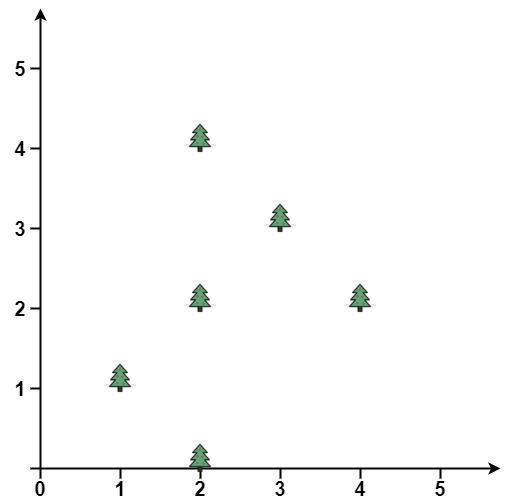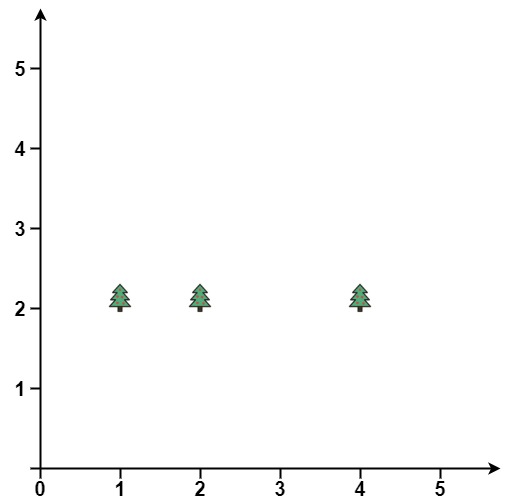Problem
You are given an array trees where trees[i] = [xi, yi] represents the location of a tree in the garden.
You are asked to fence the entire garden using the minimum length of rope as it is expensive. The garden is well fenced only if all the trees are enclosed.
Return the coordinates of trees that are exactly located on the fence perimeter.
Example 1:

Input: points = [[1,1],[2,2],[2,0],[2,4],[3,3],[4,2]]
Output: [[1,1],[2,0],[3,3],[2,4],[4,2]]
Example 2:

Input: points = [[1,2],[2,2],[4,2]]
Output: [[4,2],[2,2],[1,2]]
Constraints:
1 <= points.length <= 3000points[i].length == 20 <= xi, yi <= 100All the given points are unique.
Solution (Java)
import java.util.Arrays;
public class Solution {
private static final int MAX = 100;
public int[][] outerTrees(int[][] trees) {
int n = trees.length;
if (n <= 2) {
return trees;
}
radixSort2D(trees);
int[][] st = new int[n * 2][];
int idx = 0;
for (int[] t : trees) {
while (idx > 1 && polarOrder(st[idx - 2], st[idx - 1], t) < 0) {
idx--;
}
st[idx++] = t;
}
for (int i = n - 1; i >= 0; i--) {
while (idx > 1 && polarOrder(st[idx - 2], st[idx - 1], trees[i]) < 0) {
idx--;
}
st[idx++] = trees[i];
}
return Arrays.stream(st, 0, idx).distinct().toArray(int[][]::new);
}
private void radixSort2D(int[][] trees) {
int[][] aux = new int[trees.length][];
for (int p = 1; p >= 0; p--) {
int[] count = new int[MAX + 2];
for (int[] t : trees) {
count[t[p] + 1]++;
}
for (int c = 0; c <= MAX; c++) {
count[c + 1] += count[c];
}
for (int[] t : trees) {
aux[count[t[p]]++] = t;
}
System.arraycopy(aux, 0, trees, 0, trees.length);
}
}
private int polarOrder(int[] p, int[] q, int[] r) {
return (q[0] - p[0]) * (r[1] - q[1]) - (q[1] - p[1]) * (r[0] - q[0]);
}
}
Solution (Javascript)
/**
* @param {number[][]} trees
* @return {number[][]}
*/
var outerTrees = function(trees) {
trees.sort((a,b) => (a[0] - b[0]) || (a[1] - b[1]));
let upper = [];
let lower = [];
for (let t of trees){
while (upper.length >= 2 && ccw(upper[upper.length - 2], upper[upper.length-1], t) < 0){
upper.pop();
}
while (lower.length >= 2 && ccw(lower[lower.length -2], lower[lower.length-1], t) > 0){
lower.pop();
}
upper.push(t);
lower.push(t);
}
return [...new Set([...upper,...lower])];
};
function ccw(p1, p2, p3){
return (p3[1] - p2[1])*(p2[0]-p1[0]) - (p2[1]-p1[1])*(p3[0]-p2[0]);
}
Explain:
nope.
Complexity:
- Time complexity : O(n).
- Space complexity : O(n).